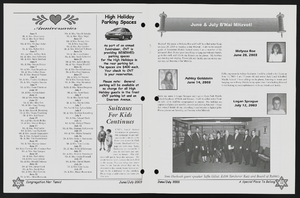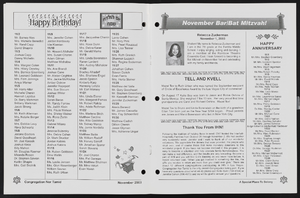Search the Special Collections and Archives Portal
Search Results
Temple Sinai roundtable oral history interview
Identifier
Abstract
Oral history interview with the Temple Sinai roundtable conducted by Barbara Tabach on April 26, 2016 for the Southern Nevada Jewish Heritage Project. In this interview, five congregation members of Temple Sinai in Las Vegas, Nevada talk about its formation in 2007 as a result of the merge between two struggling synagogues, Adat Ari El and Temple Beth Am. They discuss the struggles each synagogue had leading up to the merge and Temple Sinai's current Jewish community. Foremost, the members explain the personal connections they each have with Temple Sinai as well as the warm atmosphere they strive to uphold for all of the congregation.
Archival Collection
Shaw, Gilbert "Gil", 1928-
Gilbert Shaw, better known as Gil, was raised in Milwaukee, Wisconsin, and Los Angeles, California, where he had his bar mitzvah. At the age of 17, he enlisted in the US Navy and became a combat correspondent. The next twenty-seven years was a military career in both the Navy and Coast Guard and included service in both Korea and Vietnam. His training as a journalist and photographer gave him a trained eye on the history around him. This gave him a keen eye on his experiences as a founding member of Las Vegas' first Reform Judaism synagogue, Congregation Ner Tamid.
Person

Transcript of interview with Greg Goussak by Barbara Tabach, May 19, 2015
Date
Archival Collection
Description
Interview with Greg Goussak by Barbara Tabach on May 19, 2015. In this interview Goussak discusses his upbringing in Las Vegas, including his education in the Clark County School District and his experience with bussing to Sixth Grade Centers as the school district attempted to desegregate. As a teenager, he became involved with the B'nai B'rith Youth Organization through Temple Beth Sholom. Goussak talks about his mother's involvement with the Albert Einstein Hebrew Day School, which later moved and became the Dr. Miriam and Sheldon Adelson Educational Campus, and the kidnapping of Cary Sayegh. He then discusses finding his niche in accounting through taking an accounting course at UNLV as a high school student. Goussak talks about his education, career path as a controller in the gaming industry and public works projects, and becoming a professor.
Greg Goussak is a Las Vegas native, born January 1961, just after his parents moved to the city for his father's work as an accountant. His mother was a dedicated educator, who served throughout the city as a teacher and principal, including as the director of the Hebrew Day School in the 1970s. Greg's childhood was shaped by experiences with Las Vegas' sixth grade centers, challenges with scoliosis, and especially, involvement with B'nai B'rith Youth Organization (BBYO). In 1974, Greg helped start the city's new Aleph Zadik Aleph (AZA) chapter for BBYO, and his involvement with this youth organization became a formative part of his junior high and high school years. During this time, he became very involved with AZA at the regional, district and national levels, and made lifelong friends. As a high school student, Greg participated in UNLV's Early Studies Program, earning him college credit, and there he discovered his aptitude for accounting. He began tutoring fellow high school students in accounting, and thus, simultaneously discovered his passion for teaching. After earning his bachelor's degree in hospitality administration from UNLV in 1984, Greg got a job at Dunes Hotel and Casino, then under the leadership of Moe Shenker, working as an operations analyst. Over the next decade, Greg worked as a controller at several properties around town, including Nevada Palace, the Four Queens, Fitzgeralds, as well as a project on Boulder Highway. In 1992, seeking a reprieve from the gaming industry, Greg went back to UNLV to achieve his master's degree, in hotel administration. After graduating, he worked for Riviera Hotel and Casino, and established and oversaw their auditing department as well as box office. During this time, Greg met his wife Cynthia (Cindy) Riceberg, and the two were married in 1996. That same year, Greg took a position with Sigma Game, and soon after became Chief Financial Officer for Manpower Temporary Staffing. In 2002, deciding it was time to work for himself, he bought Haynes and Thomas Printers, which he owned and operated for the next eight years. Greg started teaching in 1989 as an adjunct professor in the William F. Harrah College of Hotel Administration at UNLV. In 2010, having finished his doctorate the year before, Greg assumed his first fulltime faculty position as an assistant professor at the University of Southern Nevada. The next year he was hired as an assistant professor at Ashford University, where he continues to teach today in the Forbes School of Business. Greg and Cindy have two daughters: Ariel, who is seventeen years old, and Alyssa, who is fourteen years old.
Text

Transcript of interview with David and Iris Torjman by Barbara Tabach, November 12, 2015
Date
Archival Collection
Description
In this interview, the Torjmans recall meeting at Temple Beth Sholom and their careers in Las Vegas. David Torjman was a Hebrew School teacher at Temple Beth Sholom, and later became a dealer at the Rainbow Club and Tropicana. Iris was a health aide for the Clark County School District.
In 1964, a young Hebrew school teacher was recruited to teach at Temple Beth Sholom. Soon he met Iris Schwartz who had moved to Las Vegas to live with her aunt. Less than two years later David proposed to Iris in Jack Entratter's suite at the Sands; had a New York wedding and then a local wedding thrown by the Sisterhood at Temple Beth Sholom. The couple came from distinctively different Jewish backgrounds. David was born and raised in Morocco and was educated in trades at the ORT Vocational School in Fez, Morocco. He then studied at Sunderland Talmudical College in England before immigrating to the United States. Iris was a native of Bronx, New York. And tells how before the couple met in Las Vegas that they actually lived within blocks of each other in New York. She moved to Las Vegas to live with relatives as a young woman. In 1964 destiny brought them together. David?s career as a Hebrew school teacher brought him to Temple Beth Sholom, a career that lasted for three years. He then worked for Jerry Hory?s Hock Shop and later became a dealer for the Rainbow Club and the Tropicana. Iris worked for the Clark County School District as a health aide. They have been successful investors in local property and enjoy their retirement. They tell the story of meeting and creating a life in Las Vegas where they raised their three children.
Text

Transcript of interview with Michael Saltman by Barbara Tabach, December 16, 2014
Date
Archival Collection
Description
In this interview, Michael Saltman recounts his family background, his schooling in Michigan, and living abroad in London and Munich. His travels to Israel in 1968 reinforced his connection to Judaism. Saltman and his wife, Sonja, moved to Las Vegas in 1975 and he began working with Larry Larkin, who eventually became his partner. He discusses several projects he completed with Larkin, including shopping centers and apartment complexes. He talks about the changes in Las Vegas that came about from the availability of financing from legitimate sources, and the population growth of the area. He then talks about his involvement in the local Jewish community with the Jewish Federation, Anti-Defamation League and Congregation Ner Tamid.
In 1942, Michael Saltman, the son of a rugged Canadian entrepreneur and of an educator, was born in Flint, Michigan. Michael spent a fulfilling childhood in Flint, where his family was involved in the Jewish community, even helping start a new temple. However, his life changed dramatically when his father passed away during his teenage years. At his mother's insistence, Michael went to law school after graduating from Michigan State University, and received his Juris doctor from Wayne State University. From Detroit, Michael headed to London to participate in an LL.M. program, though he quickly withdrew and landed a position with a life insurance and investment company in London. Michael soon relocated to the company's Geneva office, where his job included establishing operations in Israel. It was during these trips that he more intensely connected with Judaism and his Jewish identity. Michael left the company to join a former colleague at Shareholders Capital Corporation, where he met his wife Sonja. The couple moved to Munich, where they lived until 1975, until moving to Las Vegas. In Las Vegas, Michael became a successful real estate developer. His projects include apartments, shopping centers and office parks, like Village Apartments, Campus Village Shopping Center and Renaissance Center. He later opened Food 4 Less grocery stores in Nevada, Utah and California, eventually buying the Kansas-based company from Lou Falley. He and his partner later sold the company to Kroger. Michael served on the local Jewish Federation's board of directors, and Sonja is a longtime board member for the Anti-Defamation League's regional office in Las Vegas. In 2003, Michael and Sonja co-founded the Saltman Center for Conflict Resolution within William S. Boyd School of Law. Michael's other efforts to promote peaceful conflict resolution include the production of Streetball Hafla, a movie shot in Israel about Jewish and Palestinian teenagers interacting in basketball camp.
Text

Transcript of interview with Dorothy Eisenberg by Barbara Tabach, October 23, 2014
Date
Archival Collection
Description
Interview with Dorothy Eisenberg by Barbara Tabach on October 23, 2014. In this interview, Eisenberg discusses her upbringing on the east coast and becoming a widow with four children. She met her second husband at a synagogue, and they moved to Las Vegas for a fresh start. Eisenberg became involved with Temple Beth Sholom, and the Las Vegas League of Women Voters. She has a school named after her in the Clark County School District.
Dorothy Eisenberg is a first generation American, with roots in Ukraine and Central Europe, and grew up in Philadelphia. Judaism was a significant part of Dorothy's life from the beginning, and both her and her brother spent many of their afternoons at Hebrew school and most weekends at Shabbat services as adolescents. Eisenberg moved to Las Vegas with her children and second husband in 1964. She became an influential member of the community and served as the Jewish Federation of Las Vegas's first female president. She was also actively involved in the League of Women Voters of Las Vegas Valley, including leading the organization's advocacy for school desegregation and serving as its president for two years.
Text




